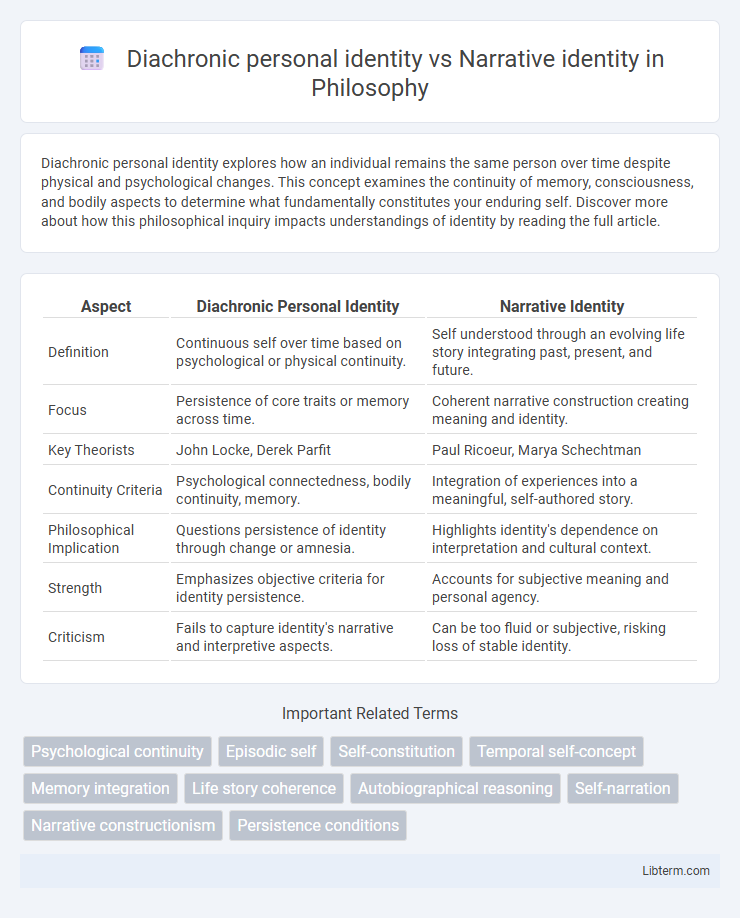Diachronic personal identity explores how an individual remains the same person over time despite physical and psychological changes. This concept examines the continuity of memory, consciousness, and bodily aspects to determine what fundamentally constitutes your enduring self. Discover more about how this philosophical inquiry impacts understandings of identity by reading the full article.
Table of Comparison
| Aspect | Diachronic Personal Identity | Narrative Identity |
|---|---|---|
| Definition | Continuous self over time based on psychological or physical continuity. | Self understood through an evolving life story integrating past, present, and future. |
| Focus | Persistence of core traits or memory across time. | Coherent narrative construction creating meaning and identity. |
| Key Theorists | John Locke, Derek Parfit | Paul Ricoeur, Marya Schechtman |
| Continuity Criteria | Psychological connectedness, bodily continuity, memory. | Integration of experiences into a meaningful, self-authored story. |
| Philosophical Implication | Questions persistence of identity through change or amnesia. | Highlights identity's dependence on interpretation and cultural context. |
| Strength | Emphasizes objective criteria for identity persistence. | Accounts for subjective meaning and personal agency. |
| Criticism | Fails to capture identity's narrative and interpretive aspects. | Can be too fluid or subjective, risking loss of stable identity. |
Introduction to Personal Identity
Diachronic personal identity examines the persistence of a self over time through psychological and biological continuity, emphasizing memory, consciousness, and physical survival. Narrative identity frames personal identity as a coherent self-constructed story integrating past experiences, present actions, and future goals to create meaning and unity. Both approaches offer essential insights into how individuals understand their existence and maintain a stable sense of self across time.
Defining Diachronic Personal Identity
Diachronic personal identity refers to the persistence of an individual's identity over time despite various changes in physical and psychological states, emphasizing continuity through memory, bodily continuity, or psychological connections. This concept addresses how a person remains the same entity from one moment to another across different stages of life. Philosophical discussions often contrast diachronic personal identity with narrative identity, which constructs selfhood through the unfolding story and coherence of personal experiences.
Exploring Narrative Identity Concepts
Exploring narrative identity concepts reveals how individuals construct a coherent self by integrating past experiences into an evolving life story, contrasting with diachronic personal identity which emphasizes numerical sameness over time. Narrative identity theory highlights the role of storytelling in shaping memory, meaning, and personal growth, allowing individuals to make sense of change and continuity within their lives. This approach links psychological well-being to the ability to create a meaningful, unified narrative that reflects both stability and transformation.
Historical Background of Identity Theories
Historical background of identity theories reveals Diachronic personal identity as rooted in Locke's early modern philosophy, emphasizing psychological continuity over time through memory and consciousness. Narrative identity emerged from 20th-century philosophical and psychological discourse, focusing on the self as an evolving story shaped by experiences and cultural contexts. These paradigms reflect shifts from static, memory-based criteria to dynamic, interpretive frameworks for understanding personal identity.
Key Differences Between Diachronic and Narrative Identity
Diachronic personal identity emphasizes the psychological and physical continuity of a person over time, focusing on memory, consciousness, and bodily persistence. Narrative identity, in contrast, constructs the self through an evolving story that integrates past experiences and future aspirations to create meaning and coherence. The key difference lies in diachronic identity's reliance on objective continuity, whereas narrative identity highlights subjective meaning-making and interpretive self-understanding.
Philosophical Debates on Personal Continuity
Philosophical debates on personal continuity explore Diachronic personal identity, which emphasizes psychological and physical persistence over time, in contrast to Narrative identity that prioritizes the coherent life story shaping self-concept. Key theorists like Derek Parfit challenge traditional substance-based views by highlighting psychological connectedness and continuity, raising questions about memory, consciousness, and the self's persistence. Narrative identity, underscored by philosophers such as Paul Ricoeur, frames personal identity through evolving autobiographical interpretation, integrating temporality and moral agency within a dynamic self-understanding.
The Role of Memory in Identity Formation
Memory plays a crucial role in diachronic personal identity by providing psychological continuity through the retention of past experiences, which anchors a person's sense of self over time. In narrative identity, memory functions as the foundational material from which individuals construct coherent and meaningful life stories, integrating diverse events into a unified self-concept. Both perspectives emphasize that the selective recall and interpretation of memories shape how identity is maintained and understood across temporal dimensions.
Critiques of Diachronic Identity Models
Diachronic personal identity models face critiques for their reliance on psychological continuity, which struggles to account for drastic personality changes or amnesia cases, challenging the notion of a stable self over time. These models often inadequately address the fragmented and evolving nature of human experience, failing to capture the fluidity emphasized by narrative identity theories. Narrative identity, by contrast, incorporates the coherence of personal stories and self-interpretation, offering a more adaptable framework that reflects how individuals construct meaning through evolving life narratives.
Narrative Approaches in Real-life Applications
Narrative approaches to personal identity emphasize the evolving stories individuals construct to make sense of their experiences and shape their sense of self over time. In real-life applications, therapists utilize narrative identity frameworks to help clients reinterpret past events, fostering psychological resilience and coherence in their life stories. This method contrasts with diachronic personal identity theories, which focus more on continuity of psychological or physical traits rather than the meaning-making process embedded in personal narratives.
Conclusion: Integrating Identity Perspectives
Diachronic personal identity emphasizes the continuity of the self over time through psychological or physical persistence, while narrative identity focuses on the cohesive story individuals construct to make sense of their experiences. Integrating these perspectives reveals that a stable self encompasses both ongoing personal traits and the evolving narrative that organizes life events meaningfully. This synthesis enhances understanding of identity as a dynamic interplay between enduring characteristics and the stories that provide context and coherence.
Diachronic personal identity Infographic

 libterm.com
libterm.com